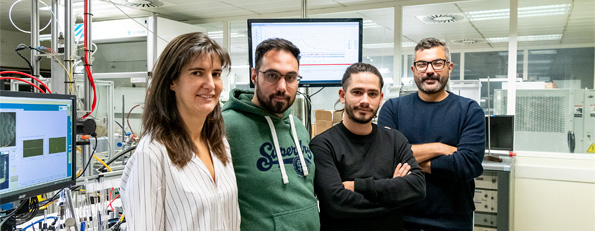More sustainable and economical
A team from the UPV and CSIC discovers a new method for generating metal nanoparticles for use as catalysts
[ 20/12/2023 ]
A team of researchers from the ITACA Institute of the Universitat Politècnica de València (UPV) and the Research Institute of Chemical Technology, a joint centre of the Spanish National Research Council (CSIC) and the UPV, has discovered a new method for the manufacture of metal nanocatalysts that is more sustainable and economical, with great potential in the industrial sector and whose use would contribute to the decarbonisation of industry. The work has been published in the journal ACS Nano.
This new method is based on the exsolution process activated by microwave radiation. Exsolution is a method of generating metallic nanoparticles on the surface of ceramic materials. "At elevated temperatures and in a reducing atmosphere (usually hydrogen), metal atoms migrate from the structure of the material to its surface, forming metal nanoparticles anchored to the surface. This anchoring significantly increases the strength and stability of these nanoparticles, which positively impacts the efficiency of these catalysts," explains Beatriz García Baños, a researcher in the Microwave Area of the ITACA Institute at the UPV.
In the work now published in ACS Nano, the UPV and CSIC researchers have shown that thanks to microwave radiation, this process can be carried out at more moderate temperatures and without the need to use reducing atmospheres.
"In this way, active nickel nanocatalysts can be produced in a more energy-efficient exsolution process. These catalysts have been proven to be active and stable for the reaction of CO production from CO¿, obtaining a product of industrial interest and contributing to the decarbonisation of the sector", highlights Alfonso Juan Carrillo Del Teso, researcher of the Energy Conversion and Storage Group of the ITQ.
The exsolution process demonstrated in nickel nanoparticles has been carried out at temperatures of around 400ºC and exposure times of a few seconds, whereas the conventional exsolution procedure in these materials occurs at temperatures of 900ºC, with times of about 10 hours. In addition, this technology allows exsolution to be performed without using hydrogen.
"For all these reasons, we improve the sustainability of the process. Moreover, by obtaining the catalysts at milder temperatures and shorter exposure times, we reduce the costs of the process, which is also influenced by not having to use hydrogen as a reducing gas," adds Beatriz García Baños.
Applications
The process developed by the UPV and CSIC team is primarily intended for high-temperature catalytic procedures for storing and converting renewable energy. It could also be applied to biogas reforming reactions for the production of synthesis gas (precursor of liquid fuels), CO2 hydrogenation reactions applicable to Power-to-X systems, and functionalising electrodes for fuel cells and/or high-temperature electrolysers.
Reference
Microwave-Driven Exsolution of Ni Nanoparticles in A-Site Deficient Perovskites. Andrés López-García, Aitor Domínguez-Saldaña, Alfonso J. Carrillo, Laura Navarrete, Maria I. Valls, Beatriz García-Baños, Pedro J. Plaza-Gonzalez, José Manuel Catala-Civera, and José Manuel SerraACS Nano 2023 17 (23), 23955-23964. DOI: 10.1021/acsnano.3c08534
Outstanding news
 ARWU 2023
ARWU 2023
The Shanghai ranking reaffirms the UPV as the best polytechnic in Spain for yet another year
 Science Meets Regions CV 2023
Science Meets Regions CV 2023
The UPV and the Almussafes City Council begin a collaboration in search of solutions to maintain the automobile sector in the Valencia Region
 Scientific reference
Scientific reference
Avelino Corma, Distinguished Research Assistant at the UPV, awarded an Honorary Doctorate by the University of Huelva
 Micronanofabs NTC UPV-PERTE CHIP Conference
Micronanofabs NTC UPV-PERTE CHIP Conference
María Marced, TSMC Europe president: "The sector's future is bright, the market is expected to double by 2030"
 Goya nomination
Goya nomination
Javier Polo, who holds a degree in Audiovisual Communication from the UPV, directs the successful short documentary Una terapia de mierda
 Sant Carles Medal 2023
Sant Carles Medal 2023
The Faculty of Fine Arts of the UPV awards the Sant Carles Medal 2023 to outstanding Valencian art and culture figures







